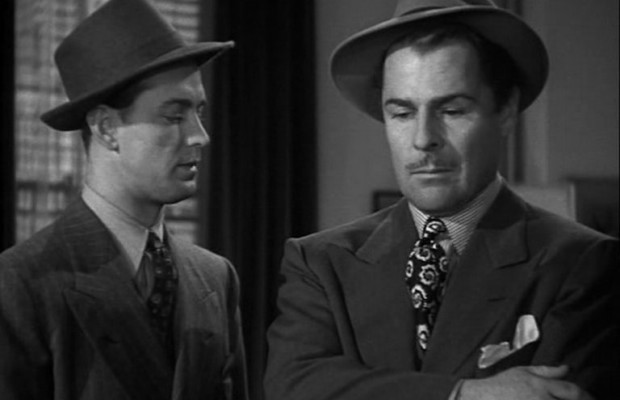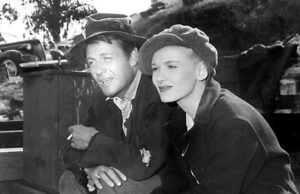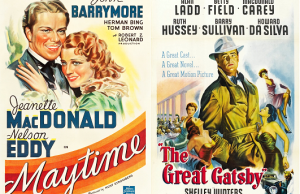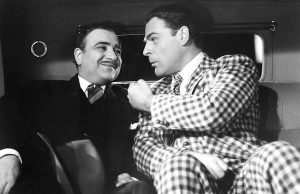The Glass Key (1942)

Toronto Film Society presented The Glass Key on Sunday, May 13, 2012 as part of Season 65 May Festival: The Dead Men Don’t Wear Plaid Weekend.
Parading murder mystery amidst background of politics, gambling czars, romance and lusty action, this revised version of Dashiell Hammett’s novel—originally made in 1935—is a good  picture of its type and an above par attraction for the regular runs. Starring combo of Brian Donlevy, VeronicaLake and Alan Ladd is okay marquee voltage, with Donlevy especially bright where ‘Glass Key’ will follow ‘Wake Island’ bookings.
picture of its type and an above par attraction for the regular runs. Starring combo of Brian Donlevy, VeronicaLake and Alan Ladd is okay marquee voltage, with Donlevy especially bright where ‘Glass Key’ will follow ‘Wake Island’ bookings.
New version of the yarn has been refurbished to overcome major faults in the 1935 film version. Scripter Jonathan Latimer has materially strengthened the story with vigorous writing.
Donlevy is the political boss, a role similar to that he handled a few years ago in ‘Great McGinty.’ Ladd is his assistant and confidant. MissLake is the vacillating daughter of the gubernatorial candidate who first makes a play for Donlevy but winds up in the arms of Ladd, while Joseph Calleia has the gambling house concessions around the city. Mixed well, the result is an entertaining whodunit with sufficient political and racketeer angles to make it good entertainment for general audiences. While Donlevy pursues his campaigning, despite suspicion of murder is cast in his direction. Ladd pursues a straight line in uncovering the real culprit.
Donlevy makes the most of his role of the political leader who fought his way up from the other side of the tracks, but is overshadowed by the fat role provided Ladd who clicks solidly as the pal and investigator. MissLake catches attention as the come-hither girl. Support is topnotch, with Calleia as the gambling czar, and William Bendix and Eddie Marr as his two henchmen. Bonita Granville turns in okay performance as Donlevy’s young sister, while Frances Gifford displays film personality in a few fleeting sequences as a nurse. Richard Denning, Calleia, Donald McBride, Margaret Hayes and Moroni Olsen are chief in support, with William Bendix and Eddie Marr clicking with a pair of semi-comedy gangster characterizations.
Direction by Stuart Heisler deftly maneuvers the characters for maximum attention, and he maintains good pace throughout. Production layout is okay.
VARIETY, Walt., August 29, 1942
THE GLASS KEY, screen play by Jonathan Latimer; based on the novel by Dashiell Hammett; directed by Stuart Heisler for Paramount.
An absorbing puzzle in murder when it was first made in 1935, “The Glass Key,” the new remake of the Dashiell Hammett thriller, still has some of the fascination of the original, despite its unevenness. The motivations of Mr. Hammett’s original characters are sometimes more than a little askew, but his sleight of hand is so expert that one only occasionally realizes one is being cheated; his characters speak in a terse, telegraphic style that blends well with violence. Unfortunately for the new film at the Criterion, it sags under the endless complexity of Mr. Hammett’s plot. All too often it paralyzes the adaptor by the necessity for exposition, and at those points the sleight of hand fails and the characters become no more than puppets in a bizarre pattern.
The whole plot is strung on a rather long bow. An easy-going ward heeler swings his vote to a reform politician and cleans out a nest of gamblers because he finds the reform candidate’s daughter winsome. Soon after, the playboy son of the reformer is slain, and the ward heeler finds himself under suspicion. The ward boss’s loyal lieutenant begins some devious  research. He is nearly killed in a mauling by the gambling-ring henchmen, pursues wisps of clues to a fantastic meeting in a publisher’s country home and finally, through a maze of strange relationships and oddly motivated conduct, he pounces on the real murderer.
research. He is nearly killed in a mauling by the gambling-ring henchmen, pursues wisps of clues to a fantastic meeting in a publisher’s country home and finally, through a maze of strange relationships and oddly motivated conduct, he pounces on the real murderer.
As the ward heeler’s pal who wrenches the truth out of bits and pieces of clues, Alan Ladd is again the cold, monosyllabic toughie he was in “This Gun for Hire.” His performance, almost more than anything else, gives “The Glass Key” its frequent suspense. As the ward-heeler, Brian Donlevy, that excellent actor, is providing a blurred carbon copy of his similar portrait in “The Great McGinty.” As the sadistic mauler William Bendix does his best by an over-wrought role, and MissVeronicaLake is still little more than a sullen voice and a head of yellow hair. Nevertheless and despite its faults, “The Glass Key” still kindles some of the excitements of a tough-spoken story.
NEW YORK TIMES, October 15, 1942
Notes compiled by Caren Feldman











Leave a Reply